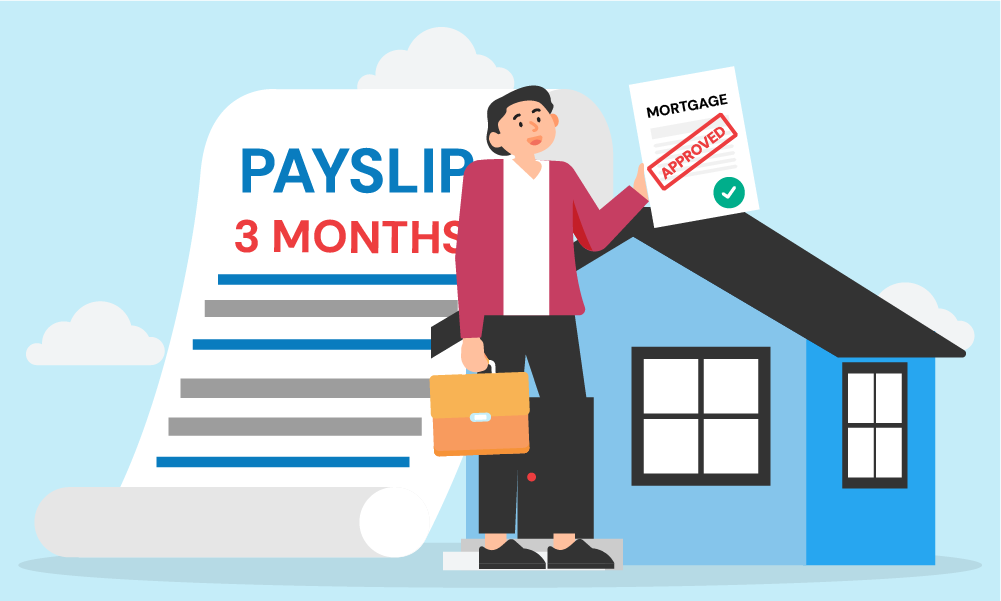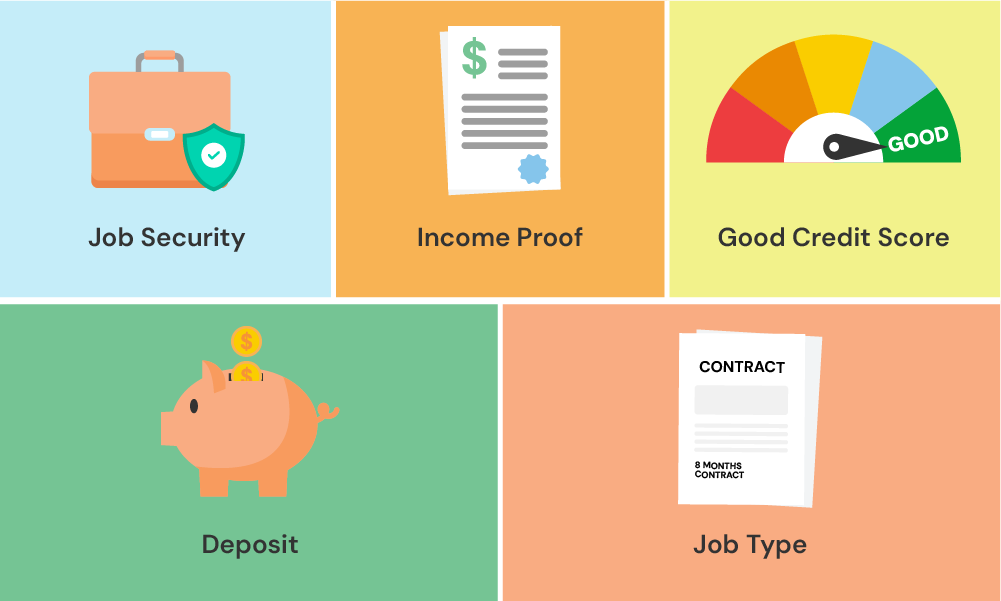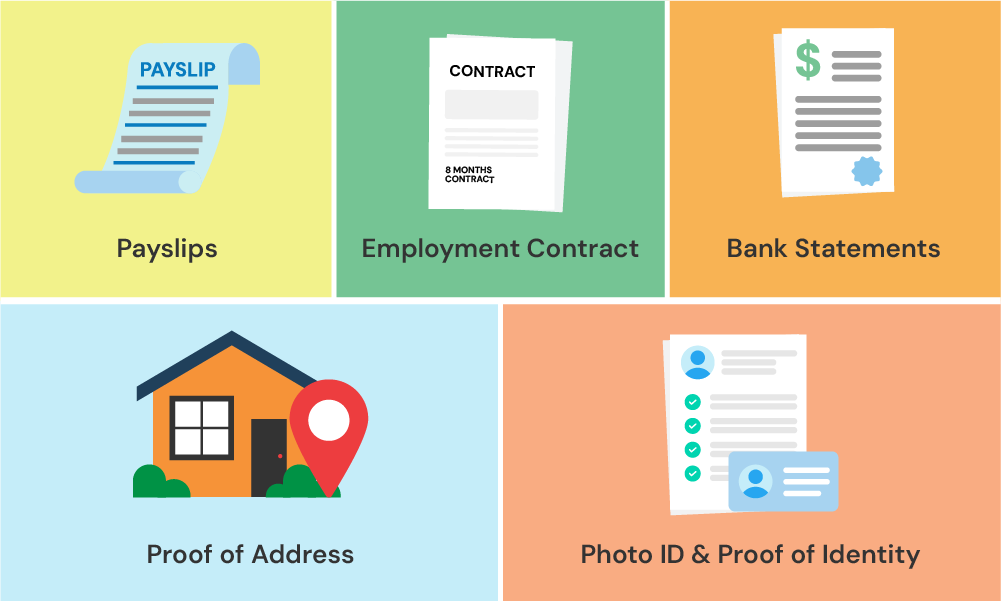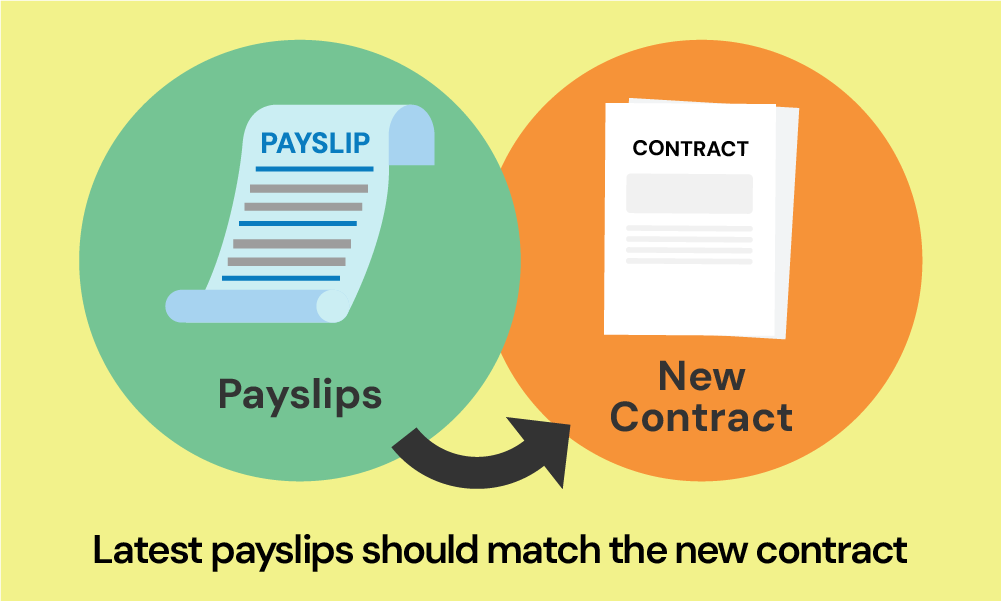- Can You Get a Mortgage with a New Job?
- What Do Lenders Look for?
- When Should I Apply for a Mortgage When Starting a New Job?
- What If You’ve Only Been in Your Job for a Few Months?
- What Paperwork Should I Have Before Mortgage Application?
- How Changing Jobs Affects Your Mortgage
- Does a New Contract Impact Your Mortgage?
- Does a Recent Pay Increase Improve Your Mortgage?
- Are There Mortgage Options During a Probationary Period?
- Which Mortgage Lenders Consider Applicants with New Jobs?
- Can You Remortgage with a New Job?
- The Bottom Line
How To Get a Mortgage With A New Job?

Starting a new career is thrilling, but buying a house while your income settles can be daunting.
We get it.
This guide tackles the ins and outs of getting a mortgage with a new job, helping you make informed decisions and land your perfect home with confidence.
Can You Get a Mortgage with a New Job?
Yes, you can get a mortgage with a new job. It’s quite common for people to apply for a mortgage when they’ve just started working somewhere new.
Different lenders have their own rules about this, so while some might be accepting of your new job situation, others might want to look at it more closely.
One thing to keep in mind is that many lenders like to see that you’ve been in your job for at least three months. This gives them confidence that your job is stable and you’ll keep earning money to pay back the mortgage.
But, it’s not the same everywhere.
Some lenders are happy to consider you even if you’re about to start your job, as long as you have a contract saying when you’ll start and how much you’ll earn.
There are also special situations that some lenders are okay with, such as:
- If you’ve just started a new job.
- If you’ve signed a new contract with your current employer.
- If you have a job offer but haven’t started yet.
- If you’re working on a temporary contract.
- If you’re in a trial period at your job.
- If you’ve recently qualified for a professional job like a doctor, teacher, or accountant.
- If you’ve just become self-employed.

What Do Lenders Look for?
When lenders look at your mortgage application, they’re interested in a few key things to make sure you can pay back what you borrow.
Here’s what they care about:
- Your Job Stability. They want to know that your job is secure. This doesn’t mean you need a permanent contract. People with new contracts or probation periods can also be seen as good candidates, especially if they have a solid work history.
- Your Income. Lenders will look at how much you earn from your new job to make sure you can afford the mortgage payments. It’s important to show them clear proof of your income.
- Your Credit History. A good credit history helps show lenders that you’re good at managing your money. This can make them more likely to give you a mortgage.
- Your Deposit. The more money you can put down as a deposit, the better. A bigger deposit usually means a smaller loan and less risk for the lender.
- The Type of Job You Have. Some lenders might also consider what kind of job you have. Certain professions with a steady income and job security might make your application stronger.
- Your Overall Money Management. If you can show lenders that you’re good at saving money and don’t have a lot of debt, this can help your application.
Remember, every lender is different, so if one lender says no, another might say yes. It can be really helpful to talk to a mortgage broker. They can guide you to lenders who are more likely to say yes to someone in your situation.

When Should I Apply for a Mortgage When Starting a New Job?
The optimal time to apply for a mortgage with a new job depends on your circumstances and lender preferences.
Consider both the pros and cons of applying immediately versus waiting:
Here are the pros and cons if you applied immediately:
Pros
- Secure your desired property before it sells to someone else.
- Potentially benefit from lower interest rates if they rise later.
Cons
- Lenders may prefer a more established employment history, potentially limiting options.
- You may have fewer payslips to prove your income, making affordability assessment less clear.
However, if you waited for a bit:
Pros
- Allows you to build a stronger employment history, potentially increasing your eligibility for better deals.
- More payslips provide a clearer picture of your income, making affordability easier to assess.
Cons
- Risks missing out on your dream property if it sells quickly.
- Interest rates might increase during your wait, making the mortgage more expensive.
Ultimately, the best timing depends on:
- Your urgency – Do you have a strict timeline to purchase?
- Your financial strength – Can you afford potential delays?
- Your job stability – Are you confident in your new role’s long-term prospects?
Seeking professional advice from a mortgage broker can help you weigh these factors and determine the optimal timing for your situation.
What If You’ve Only Been in Your Job for a Few Months?
Having a short job tenure with a new job can make getting a mortgage more challenging, but it’s not impossible.
Here are some tips to enhance your application:
- Gather strong documentation. Provide your contract, expected start date, and salary details to demonstrate income clarity.
- Highlight consistent employment history. If you have a strong overall employment record, even if not with your current employer, emphasise it in your application.
- Showcase financial stability. Demonstrate responsible financial management through consistent savings, low debt levels, and a good credit score.
- Consider a larger deposit. A larger deposit reduces the loan amount and loan-to-value ratio (LTV), making you a less risky borrower.
- Explore specialist lenders. Some lenders cater specifically to applicants with new jobs or less traditional employment arrangements.
- Seek professional advice. A mortgage broker can guide you through the process, identify suitable lenders, and negotiate the best possible mortgage terms for your situation.
What Paperwork Should I Have Before Mortgage Application?
To get a mortgage with a new job, here’s what you’ll typically need:
- Payslips. Ideally, provide at least 3 months of payslips from your new employer. If you haven’t started yet, include your employment contract and expected start date.
- Employment Contract. Your signed contract from your new employer outlining your salary, benefits, and employment terms is crucial.
- Bank Statements. Recent bank statements showcasing your income and regular spending habits can strengthen your application.
- Proof of Address. Utility bills or council tax statements confirm your residency for verification purposes.
- Photo ID & Proof of Identity. A valid passport or driving licence and a recent utility bill or bank statement with your name and address are typically required.
If your application involves a new job, you must explain your expected start date and provide an offer letter or contract confirmation. Also, if you received a recent pay rise, ensure your payslips and contract reflect the updated income.

How Changing Jobs Affects Your Mortgage
Switching jobs doesn’t always make it harder to get a mortgage.
If you move to a similar job in the same area, like a teacher going to a new school or a nurse to another hospital, it could help your application. This is because lenders value continuity and stability within the same industry.
On the other hand, if you change your job to shift careers, lenders might be more stricter with their requirements. They may need more proof of your income and job stability to see if you can afford to pay your mortgage.
Overall, it’s important to tell the lender about all the jobs you’ve had. If you haven’t been at a job for at least a year, some lenders might be a bit cautious. They want to see a steady job history to feel sure you can pay back the mortgage.

Does a New Contract Impact Your Mortgage?
Landing a new contract with your current employer can affect your mortgage application, but it depends on the contract type.
If your contract simply extends your current role, lenders may see it as job security and not a fresh start. However, if you have a new contract from a new company, some lenders might treat it as a new beginning, requiring closer scrutiny.
Be prepared with clear documentation of the following:
- Contract – Clear copy with your start date and salary details.
- Payslips – The latest three months reflecting the new contract.
- Employment history – Highlight consistent employment, especially if the new contract shows career progress or a raise.
Remember to check if your latest payslips match your new contract for a smoother process. This shows lenders your financial situation is stable and aligns with your new contract.

Does a Recent Pay Increase Improve Your Mortgage?
Certainly, a recent pay increase is a significant boost to your mortgage application.
Lenders prioritise your current earnings to determine your loan affordability, and a higher income indicates an enhanced capacity to manage monthly mortgage repayments.
Presenting official documentation, such as updated payslips or an employer’s letter confirming your pay rise, is important to confirm your increased earnings.
It’s worth noting that lenders value consistency in your income history, often looking for at least three months of stable earnings.
Thus, while a new pay increase is beneficial, its immediate impact may vary depending on its recency.
Nonetheless, such documentation of an income boost positively influences your financial profile.

Are There Mortgage Options During a Probationary Period?
Being on probation at your job doesn’t mean you can’t get a mortgage, but it does make things a bit trickier.
Lenders usually look for job stability, so having a permanent job is often seen as a plus. However, there are still ways to get a mortgage if you’re in your probation period.
If you work in certain jobs like teaching or accounting, you might find it easier to get a mortgage. These jobs have clear paths for moving up the ladder, which can make lenders more willing to consider you even if you’re on probation.
When you’re applying for a mortgage during your probationary period, it helps a lot to show that you’ve always had steady work and that you’re serious about your career.
Letting lenders know about your career commitment and showing proof, like positive reviews at work, can make your application stronger.
Also, putting down a bigger deposit can help convince lenders you’re a good bet because it lowers their risk and shows you’re serious about buying a home.
Which Mortgage Lenders Consider Applicants with New Jobs?
If you’ve recently started a new job and need a mortgage, some lenders are more willing to consider your application than others.
These lenders look at the details of your job offer, your career path so far, and how much you’ll be earning. It’s a good idea to get help from a mortgage broker.
They know which lenders are open to working with people who have just changed jobs or are about to start a new one.
They can guide you towards lenders like Tipton, TSB, HSBC, Skipton, Precise, and Saffron, who all have their ways of assessing applications from people in new jobs or certain professions.
Can You Remortgage with a New Job?
Yes, you can remortgage even if you’ve recently started a new job.
Lenders will look at how stable your new job is and whether you’re able to keep up with mortgage payments.
If you’ve been promoted or got a pay rise, this could make your remortgage application stronger. Showing a consistent work history and providing details about your new job are key. The decision may also hinge on your credit score and how much equity you have in your home.
Talking to a mortgage broker can make this process easier. They can help you find the right lenders for your situation and give you advice on how to present your application.

The Bottom Line
Using a mortgage broker can make finding the right mortgage much easier, especially if you’ve recently started a new job.
Brokers have access to a wide range of mortgage products and know which lenders are more likely to accept your application.
They can save you time and stress by matching you with the best deals for your situation.
If you’re unsure where to start, get in touch with us. We can connect you with a reliable broker who understands your specific needs and can guide you through the mortgage process.
Get Matched With Your Dream Mortgage Advisor...

Frequently asked questions
Do I need to inform my lender about a job change?
Yes, it’s important to tell your lender if you change jobs. Your employment status is a key part of your mortgage agreement, and any changes could affect your ability to meet your payments.
Can I get a mortgage if relocating for a job?
Yes, you can get a mortgage when relocating for a job. Lenders will consider your new job’s salary and stability just like any other employment situation. Having a job offer letter can help your application.
What if I’ve recently become self-employed?
Getting a mortgage when you’ve recently become self-employed is possible, but you may need to provide additional paperwork, such as your business plan or proof of income. Lenders will look for evidence that your self-employment is stable and profitable.
How does handing in my notice affect my mortgage application?
Handing in your notice can affect your mortgage application because it changes your employment status. If you’re planning to change jobs or become self-employed, it’s best to discuss this with your lender or broker as it may impact your ability to secure a mortgage.
Can future raises count for your mortgage?
In some cases, lenders might consider future income increases, but it’s not guaranteed. This usually depends on the lender, your profession, and how likely your raise seems.
For example, if you’re a doctor with a guaranteed contract and a scheduled raise, it might be considered. But for less predictable professions, it’s less likely.
This article has been fact checked
This article was created, checked, and verified by the expert team at Money Saving Guru. Trust us, you’re in good hands.




